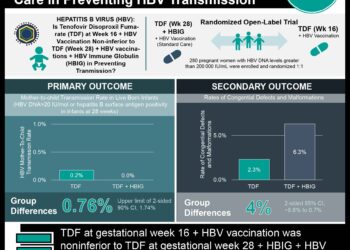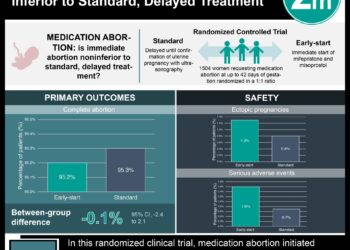Patient centeredness poor predictor of fertility care dropout
Image: PD
1. Overall, clinic factors such as patient centeredness were unrelated to continuation of fertility care.
2. Among individuals receiving non-assisted reproduction treatment (e.g. intrauterine insemination), those who reported their fertility clinic as having low respect for patient values were more likely to drop out, whereas among women receiving assisted reproduction treatment (ART), those who reported higher levels of patient involvement were more likely to drop out.
Evidence Rating Level: 2 (Good)
Study Rundown: This study found that patient-centeredness in fertility clinics was only associated with dropout in certain sub-groups. Women receiving non-ART were less likely to drop out if they felt their values were respected by fertility care providers, while women receiving ART were more likely to drop out if they experienced high levels of involvement in their care. Though past studies demonstrate that patient-centeredness is valued by patients, these findings suggest other factors, including emotional reasons, age and fertility prognosis, may be more significant in a patient’s decision to discontinue fertility treatment.
Strengths of this study include a prospective design within a large RCT, diverse study population, and assessment of patient-centeredness through both patient surveys and objective clinic characteristics. Limitations include a low response rate (54%) at the time of the initial survey may have biased results. Future studies might assess attitudes toward patient centeredness and evaluate its association with dropout rates in countries with different fertility care systems to determine generalizability.
Click to read the study in Human Reproduction
Relevant Reading: Reasons for dropout in infertility treatment
In-Depth [prospective cohort study]: This study examined the relationship between patient-centeredness and dropout rates at fertility clinics in the Netherlands. 534 non-pregnant women who had received a cycle of medically assisted reproduction (e.g. ovulation induction) in 32 fertlity clinics in 2011 were included. Patient-centeredness was assessed using questionnaires asked of patients and clinic staff. One year after completing the initial survey, patients completed a follow-up questionnaire assessing fertility status, which was classified as pregnant, compliers, dropouts, discontinuation for medical reasons, and lost to follow-up. Among non-pregnant women, dropouts were compared with compliers, defined as women still receiving fertility treatment.
Overall, no significant association was found between patient-centeredness and dropout. However, women receiving non-ART were less likely to subsequently drop out after rating their fertility clinic as having respect for patients’ values (OR 0.57, CI 0.34-0.95), while women receiving ART were more likely to drop out after rating patient involvement highly (OR 2.39, CI 1.02-5.59).
By Denise Pong and Leah Hawkins
More from this author: High BMI in early adulthood linked to reduced risk of endometriosis, Obtaining consent for c-section during labor may be suboptimal, Gestational weight loss may improve outcomes for obese women
© 2013 2minutemedicine.com. All rights reserved. No works may be reproduced without written consent from 2minutemedicine.com. Disclaimer: We present factual information directly from peer reviewed medical journals. No post should be construed as medical advice and is not intended as such by the authors or by 2minutemedicine.com. PLEASE SEE A HEALTHCARE PROVIDER IN YOUR AREA IF YOU SEEK MEDICAL ADVICE OF ANY SORT. Content is produced in accordance with fair use copyrights solely and strictly for the purpose of teaching, news and criticism. No benefit, monetary or otherwise, is realized by any participants or the owner of this domain.






